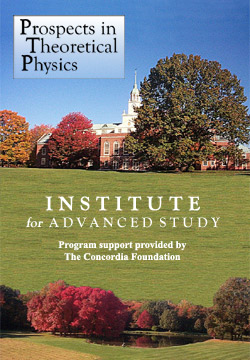|

"Aspects of Supersymmetry"
July 19 - July 30, 2010
2010 Program Supersymmetry
is one of the deepest and most important concepts in theoretical
physics. It has played a central role in the formulation of
superstring theory, in the understanding of strong coupling dynamics in
gauge theory, and in uncovering the many remarkable dualities
connecting gauge theories, string theory and gravity. Low-energy
supersymmetry is also the leading candidate for new physics at the TeV
scale, now being probed at the LHC. Prospects in Theoretical
Physics (PiTP) 2010, open to advanced graduate students and
postdoctoral fellows, aimed to give a coherent overview of the
fundamental theoretical aspects of supersymmetry, emphasizing the
common themes running throughout the subject, from the major advances made
in the duality revolution of the 90's to the most exciting recent
developments (integrability, M2/5 branes, N=2 theories and scattering
amplitudes). An introduction to the formal aspects of
SUSY breaking and softly broken SUSY at the weak scale was also given in parallel. PiTP
2010 was organized more
like a workshop than a school, and active student participation was
expected. The format consisted of three or four 75-minute
lectures per day, plus a homework/discussion session on most days, as
well. The students were expected to have a good background in
supersymmetry (at the level
of Wess & Bagger or equivalent textbook) and a good background in
string theory (at the level of Becker, Becker and Schwarz or equivalent
textbook). Detailed reading material and homework problems were
given to participants in the late spring. Lecturers and organizers for PiTP 2010 included: Nima Arkani-Hamed (Institute for Advanced Study), Jon Bagger (Johns Hopkins University), Katrin Becker (Texas A&M University), Melanie Becker
(Texas A&M University), Freddy Cachazo (Perimeter Institute), Davide Gaiotto (Institute for Advanced
Study), Daniel Jafferis (Rutgers University), Igor Klebanov (Princeton University), Juan Maldacena (Institute for Advanced Study), Greg Moore (Rutgers University), Chiara Nappi (Princeton University), Nathan Seiberg (Institute for Advanced Study), Pedro Vieira (Perimeter Institute), and Edward Witten (Institute for Advanced Study).
Background on PiTP
Prospects in Theoretical
Physics is an intensive two-week summer program designed for graduate
students and postdoctoral scholars considering a career in theoretical
physics. First held by the School of Natural Sciences at the
Institute for Advanced Study in the summer of 2002, the PiTP program is
designed to provide lecture courses and informal sessions on the latest
advances and open questions in various areas of theoretical physics.
One of the goals of the
program is to help the physics community train the next generation of
scholars in theoretical physics. A special effort is made to
reach out to women and minorities, as well as to graduate students in
small universities who typically do not have the same opportunities and
access to leaders in the field as graduate students in large research
institutions.
Prospects in Theoretical
Physics builds on the strong relationship of the research groups at the
Institute and Princeton University, and many faculty members from the
physics departments at both institutions are actively involved in the
program together with scientists from neighboring
institutions.
Additional Program History: 2002 - 2009
The
pilot program in the
summer of 2002 was an introduction to string theory tailored to
graduate students entering the field, where much attention was paid
also to particle phenomenology and cosmology. PiTP 2003 was
devoted to the problems and techniques at the interface of particle
physics and cosmology. PiTP 2004 was a program for advanced
graduate students in string theory, while PiTP 2005 was designed to
provide an introduction to collider physics. The
2006 Program covered recent
advances in string theory that have found applications to gauge
theories, integrable models, cosmology and mathematics, and
the 2007 Program - "The Standard Model and Beyond" - focused on
particle
physics phenomenology with special
emphasis on model building. In 2008 the program - entitled "Strings and
Phenomenology" - was designed for string theorists who wanted
to
learn about
issues of compactification relevant to phenomenology and cosmology, and
for phenomenologists who wanted to learn about strings and their
applications to phenomenology. The 2009 Program focused on
"Computational Astrophysics" and was designed to assist young
researchers in honing the numerical methods they employ in their own
research and to learn about the techniques used in other areas of
computational astrophysics.
For further information about
the PiTP program,
please contact Susan Higgins, (609) 734-8198; e-mail: shiggins@ias.edu 2010 PROGRAM LECTURE VIDEOS (all videos posted as of 9/7/10) 2010 PARTICIPANTS' GENERAL INFORMATION 2010 PROGRAM SCHEDULE
2010 PROGRAM PRELIMINARY PRE-READING LIST & HOMEWORK PROBLEMS (Updated as of 7/23/10) Hints
for those Applying for U.S. Visa 2010 APPLICATION FORM The deadline for applications
has now passed. We are sorry but we are unable to accept any further applications for this year's program.
|